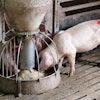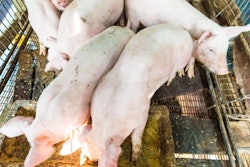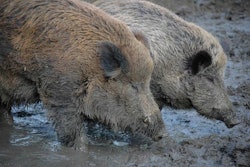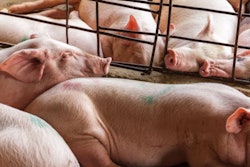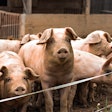
Official reporting of new cases of African swine fever by Asian states has slowed.
In China, pork prices continue to rise as the result of the African swine fever (ASF) outbreaks over the past year or more that have led to the loss of more than 40% of the country’s pig population.
In recent weeks, the wholesale price of pork has exceeded CNY50 (US$7.11) per kilo. Up until August of this year, it averaged CNY20-25, reports South China Morning Post (SCMP). As recently as August, the average was around CNY25 per kilo.
Some business owners, particularly those running restaurants, are struggling to continue their operations. The price of pork has pushed the inflation rate in China to its highest level in almost eight years, according to SCMP. Some analysts are forecasting a further jump in pork prices ahead of the Lunar New Year in January.
Philippines: spike in ASF outbreaks has passed
In the Philippines, ASF has become an economic problem for the nation’s pig sector, according to Manila Bulletin. This contrasts with the earlier situation, when it represented a massive challenge to animal health.
As the disease spread in the early stages, several provincial authorities banned the transport of live pigs and pork products into their regions in order to prevent the entry of ASF. However, this measure denied access for pig producers in disease-free areas to lucrative markets where pork was in short supply.
According to a senior official at the Department of Agriculture, the number of new ASF outbreaks is now on a downward trend.
Details of the current status of the disease in the Philippines are scant. Since ASF first entered the country in July, the infection has spread to 461 districts, according to the director of the Bureau of Animal Industry. Culls have averaged 20,000 per month, and the number of new infections spiked during October.
South Korea remains vigilant
A further six wild boar have tested positive for the ASF virus in South Korea this week. According to the latest reports from the agriculture ministry to the World Organisation for Animal Health (OIE), all were found in the forest in the north of the country, near to the border with North Korea.
Five of the animals were found in the Paju city area of Gyeonggi province, and the sixth was in Cheorwan county in Gangwon province. Previous cases have been from these areas.
ASF has been controlled among domestic pigs in South Korea, but vigilance needs to continue over the spread in wild boar. These were the key messages from Agriculture Minister Kim Hyeon-soo in a recent interview with Yonhap.
First cases were reported in wild boar on September 17. Since then, further cases were detected among the wild boar population — in 29 animals — and the virus has been found at 14 pig farms. Early October saw the most recent confirmation of the ASF virus in domestic pigs.
All the virus-positive cases have been in areas close to the border with North Korea. A series of biosecurity levels were establish in efforts to halt the spread of ASF southwards. Almost 400,000 South Korean pigs have been culled as a preventative measure.
New ASF cases in Russia’s Far East
Over the past week, the agriculture ministry in Russia has reported the death of eight wild boar to the OIE. All the animals were found in the Far Eastern federal district, Yevreyskaya (Jewish Autonomous Region).
Japan’s ag ministry seeks change in law to facilitate ASF control
With the aim of improving the response in case of as ASF outbreak, the agriculture ministry in Japan has been seeking a change in the law.
According to Japan Times, the proposed bill will speed up the response to any future ASF outbreak in Japan. It will also allow the authorities to order the culling of pigs near to a confirmed ASF outbreak. Currently, this is only permitted for the control of foot and mouth disease (FMD). The ministry sees the pre-emptive slaughter of uninfected pigs on farms near infected sites as the only viable way to prevent an epidemic, according to the report.
With the country also so far free of ASF, representatives from federal and provincial governments in Canada are meeting regularly with the pig industry to discuss a range of ASF concerns.
View our continuing coverage of the African swine fever outbreak.

